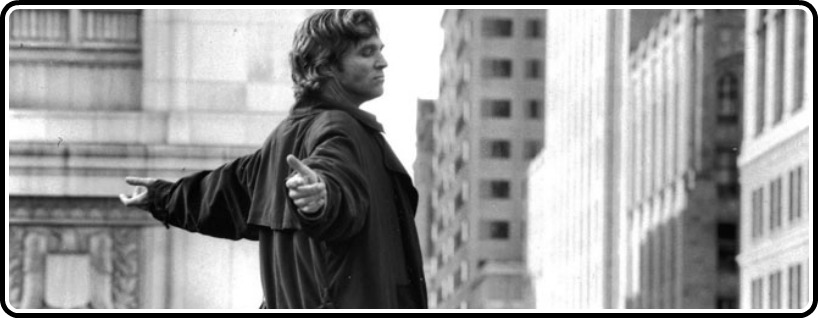Few emotions are harder to cope with and harder to express than grief. Be it the end of a relationship or the loss of a loved one, grief is a truly living and breathing thing that we as humans each deal with in our own respective way. Some shut the world off entirely, others drown themselves in it, no single person grieves the same as the next, and in an oddly romantic way, that’s a beautiful thing.
And if one looks at cinema, it’s also been an emotion or a part of the human experience that has been as mined for discussion as any topic one could imagine. However, very few deal with it as head on as an underrated gem from director Peter Weir.
Entitled Fearless, the film is now finally available on Blu-ray thanks to The Warner Archive, and stands as one of Weir’s most unsung pieces of work. Starring Jeff Bridges, the film tells the tale of a plane crash survivor named Max Klein whose life is not only flipped upside down, but his view on that said life is turned inside out. Walking away from the crash while helping a baby and a young boy, he enters a new phase of his life where he firmly believes that “already dead,” therefore has no fear and believes he has no reason to worry about his well being. With a wife and child at home that he begins to feel extremely distant from, and a fellow crash survivor who he begins to experience deep feelings for, Max’s story is a breathlessly told meditation on how it isn’t always the actual accident or act that is the most damaging, but what happens in its wake.
Despite the heaven-minded premise, the film’s greatest attribute is the pure emotion director Weir and writer Rafael Yglesias (who is adapting his own novel here) are able to mine out of such a broadly reaching premise. Weir’s direction is evocative and expressive, and gets some truly gorgeous photography from E.T. cinematographer Allen Daviau that really seems fitting of a film so firmly interested in the spiritual awakening of a man and those surrounding him. Available on home video now for the first time in nearly two decades, Weir’s film is able to, almost entirely aesthetically, communicate deep and intense emotions and philosophies to the viewer, and while the script does itself devolve during sequences into college philosophy class-style headiness, the visuals here are so resonant and unforgettable that it elevates the material. Yes, the various sequences involving the actual crash can hit things a bit on the nose, as does a sequence involving a different crash, but with a fantastic score and some gorgeous photography, Weir’s ever-moving camera feels as if it were held by a guardian angel, a good Samaritan attempting to tell the story of what news casters here call The Good Samaritan.
And it does also help when the cast here is an ensemble of great thespians at the height of their powers.
Jeff Bridges stars here as Max, giving what is very likely his best performance to date. With the face of an angel, Bridges goes from a frightened man to an enlightened one, all while letting much of the real emotion play out on his face. The script here is fine but it’s truly Bridge’s physicality that elevates the material, often drawing comparisons to the Bruno Ganz character from Wim Wenders’ masterpiece Wings Of Desire. His relationships with those surrounding him feel real and fleshed out, particularly that with his wife played by Isabella Rossellini, who herself gets a handful of sequences to really shine. John Tuturro is a stand out as well here giving a decidedly more nuanced performance than he’s been known for as of late, and a young Benicio del Toro pops in for a pair of sequences where he stands out. However, Rosie Perez nearly steals the entire show as Carla, a woman who lost her son in the crash at the film’s center. Her innocent-looking face is the perfect canvas for this story to be told, as it is her story that really brings this film to life both narratively and thematically. Again, some of the religious exposition is a bit on the head (there’s a rather famous speech given by Max about not believing in nothing that is nearly laughable), but Carla’s tale is so entrancing and emotionally rich that this becomes an unforgettable and unflinching character study of a man learning to cope with fear and grief, by trying to force them out of existence.
As a Blu-ray this one is a joy to have in the ether, but one that’s troublingly light. The transfer here, both audibly and visually, is unbelievable. The best his film has looked since its release in 1993, it’s impossible to comprehend why it has taken this long to arrive on Blu-ray. The soundtrack here is lively and sounds energetic, and despite the lack of any supplements whatsoever, this stands as a testament to Weir, a director who still is one of film’s most underrated voices. Arguably his best and most resonant film, this is a must-own release, even if it doesn’t come with any supplemental material. Sometimes, a film can stand on its own as a home video release, and this is one of those times.






![Bergman Island (The Criterion Collection) [Blu-ray]](https://criterioncast.com/wp-content/uploads/2022/11/bergman-island-the-criterion-collection-blu-ray-400x496.jpg)
![This Is Not a Burial, It’s a Resurrection (The Criterion Collection) [Blu-ray]](https://criterioncast.com/wp-content/uploads/2022/11/this-is-not-a-burial-its-a-resurrection-the-criterion-collection-blu-ray-400x496.jpg)
![Lars von Trier's Europe Trilogy (The Criterion Collection) [The Element of Crime/Epidemic/Europa] [Blu-ray]](https://criterioncast.com/wp-content/uploads/2022/11/lars-von-triers-europe-trilogy-the-criterion-collection-the-element-of-400x496.jpg)
![Imitation of Life (The Criterion Collection) [Blu-ray]](https://criterioncast.com/wp-content/uploads/2022/11/imitation-of-life-the-criterion-collection-blu-ray-400x496.jpg)
![The Adventures of Baron Munchausen (The Criterion Collection) [4K UHD]](https://criterioncast.com/wp-content/uploads/2022/11/the-adventures-of-baron-munchausen-the-criterion-collection-4k-uhd-400x496.jpg)
![Cooley High [Criterion Collection] [Blu-ray] [1975]](https://criterioncast.com/wp-content/uploads/2022/11/cooley-high-criterion-collection-blu-ray-1975-400x496.jpg)